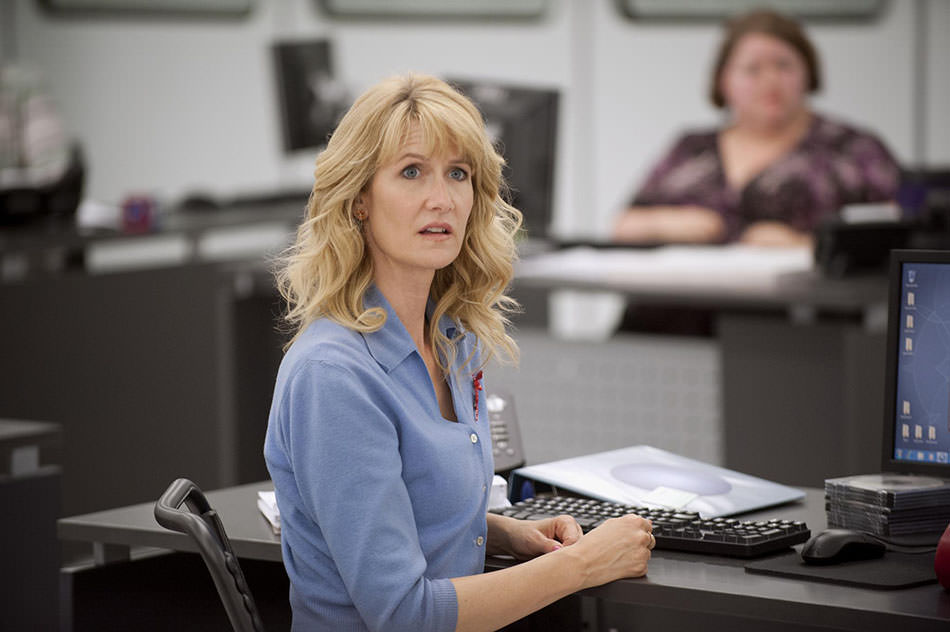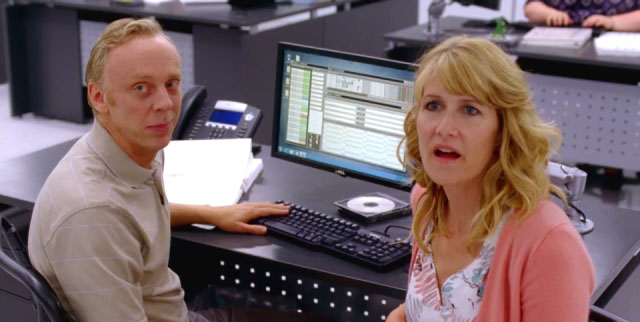Forty, still pretty, broke, living with her mother, Amy Jellicoe (played by Laura Dern) doesn’t have much to be proud of in the HBO series Enlightened, except for her job as a buyer for Abbaddon, a soulless corporate manufacturer of cosmetics and “clean meds” in Southern California. But after being told that she is being transferred from the “Health and Beauty” unit to “Cleaning Products,” Amy goes reeling through the office—looking, thanks to her disheveled hair and runny mascara, like a psycho clown—and is sent to be repaired by the healing ministrations of Open Air, a New Age therapy retreat in Hawaii. It’s easy to understand what Amy gets from Open Air, along with a bill for the $25,000 that her insurance doesn’t cover. Far from home, seduced by the pleasures of meditating on the beach, she begins to say change, agent of change, and effect change as often as she can. It’s a protective and soothing mantra, because the alternative is unthinkable. Either nothing will ever change, or Amy’s life will get worse.
In fact, things get much worse. Amy is not, as she’d hoped, given back her old job at Abbadon, which has been handed over to her (pregnant) former assistant, Krista. Only after she dithers on about suing the company for wrongful termination is she reluctantly given a position in the company’s sub-basement Cogentiva unit: a science-fiction prison-submarine data-entry hell, office-managed by Dougie, who everyone agrees is an idiot. Cogentiva is an apparent dumping-ground for employees whom the company hasn’t figured out how to fire, but it also has an evil mission: it tracks the productivity of Abbaddon’s other workers so the corporation can get rid of the slowest ones and save money.
Compared to flashier series such as Girls and Homeland, Enlightened, now finishing its second season, has been slow to find its audience. People complain—understandably—that the show makes them anxious, and few viewers may want to admit to having anything in common with a forty-year-old, divorced, basement-level coporate worker, living at home with Mom. But what’s most surprising about Enlightened is the intensity with which Amy and her friends get to us, how much of ourselves we may see in them, if we only have the temerity to allow it.
Amy is a tightly wound, rubber-band ball of contradictions: she’s determined but self-sabotaging, perceptive but solipsistic, generous but self-involved. She’s not stupid, but she is goofy and naive. It’s rare to see someone so deeply conflicted and ambiguous on TV, or even in contemporary film; a character plagued by so many warring impulses is more likely to be diagnosed (like Carrie Mathison, the heroine of Showtime’s Homeland) as bipolar. But Enlightened makes you conscious of how many people like Amy you know.
At Cogentiva, Tyler, a former IT worker, exiled for having hacked into the email of a woman named Julie with whom he had an unclear relationship—his password is Julie_Bitch—is assigned to help Amy master her numbingly repetitive tasks. Played by Mike White, who also writes the show, which he created and co-produces with Dern, Tyler has certain attributes of a nocturnal creature: he blinks tentatively in the daylight and hopes that whatever emerges from the glare won’t hurt him.
Tyler’s crush on Amy succumbs to their mutual assumption that she is out of his league. Still, she’s the most interesting person who has ever walked into Cogentiva. The mix of amusement, anxiety, and dismay with which Tyler observes Amy is a bedazzled version of how we are watching her. He seems to be thinking, as we are: She is completely out of her mind! Eventually, intrepid viewers may find themselves wondering, What if I worked at Cogentiva? What about people who do lead a version of Amy’s life at some version of Abbaddon? And what if that were the best-case scenario? What are the recession-era alternatives for a forty-year-old former health and beauty product buyer with well-documented mental health issues?
Among the show’s inspired touches is that Amy is at once sympathetic and annoying. She can’t keep from stalking her former boss—who transferred her out of Health and Beauty after they had an affair and with whom she claims she wants to make amends. She shatters the bubble of goodwill bouncing from guest to guest at Krista’s baby shower by telling them they should be helping an illegal immigrant mother about to be deported to Mexico. Her eagerness to communicate Open Air’s message of compassion and hope has destabilized her almost as badly as the anger she went there to learn to control.
Advertisement
Anyone who has ever had a transformative experience—recovered from a serious illness, fallen in love—will understand how hard it is for Amy to explain how she believes she’s changed. When Amy tries to read her mother a letter about their relationship that Open Air has encouraged her to write, her mother asks, “How long is this going to take, Amy?” Forced to ride the bus to work when her car won’t start, Amy tries—again with limited success—to “soften her heart” and calm her fury by loving her exhausted, sour fellow passengers, “looking at every person as having once been my mother.”
By the end of the first season, Amy has mostly failed to change her friends, her colleagues, her family—and the corporate culture at Abbaddon. In season two, she’s decided to change the world instead. When she finds out that (surprise!) Abbaddon is involved in some corporate malfeasance, harmful to the environment and possibly including the bribery of government officials, she contacts a reporter from the Los Angeles Times, who alternately tolerates and encourages her. Amy decides to expose Abbaddon and involves Tyler and Dougie as co-conspirators in her revolutionary plot. How awesome to get revenge against those who have refused to listen or (as Amy would say) see her—and maybe help the planet at the same time!
There is a cringe-producing moment when Amy, confirmed in her suspicions about Abbaddon, says, “Someone should know about this!” It’s the same way she’d responded to the story about the immigrant mother—the right way, the hopeless way. Into that one sentence is compressed everything that is admirable and sad about idealism: activism’s special chemistry of altruism, selflessness, and narcissism. The push and pull of the drama queen with her heart in the right place.
Amy and Tyler and their friends and loved ones are all facing (or fending off) humbling confrontations with the severely limited satisfactions that their lives offer, and with the alternatives: solitude, tedium, poverty, failure, and so forth. Amy insists on believing that her future still promises opportunities for self-improvement,“growth,” and social justice, preferably brought about by Amy. But what gives the show its depth, casting shadows on the bright comedy and the sunny California setting, is that Amy and those around her are plagued by the terror that their lives are “meaningless and small.” No longer young, but not old enough for the compromises of middle age, Amy and her friends are trying hard not to acknowledge that this is it: their one and only life.
The young women in Girls, which airs before Enlightened on Sunday nights, are obsessed with the age-appropriate question of what they are going to be. Regardless of the daily setbacks and frustrations they face, they never doubt that they are in the process of becoming, that they will become something special, most likely in the arts. Amy, Tyler, and Dougie are not likely to become anything other than less unhappy, more stable versions of what they are. So they’ll settle for doing something, for romance or flirtation, for the gratification of seeing Abbaddon embarrassed and its leaders brought low. Start a revolution! Amy, Tyler, and Dougie, the whistle-blowing corporate avengers powered by a Hawaiian therapy-center breeze.
Watching Enlightened, I keep thinking of the end of Uncle Vanya. Yelena, the Professor, and the heartthrob Doctor Astrov have departed, taking with them all hope of love, rescue, and happiness, and leaving Vanya and his young niece Sonya to face the bleak prospects ahead.
Here is Sonya’s last speech, in Ann Dunnigan’s translation:
We shall go on living, Uncle Vanya. We shall live through a long, long chain of days and endless evenings; we shall patiently bear the trials fate sends us; we’ll work for others, now and in our old age, without ever knowing rest, and when our time comes, we shall die submissively…and God will have pity on us; and you and I, Uncle, dear Uncle, shall behold a life that is bright, beautiful, and fine. We shall rejoice and look back on our present troubles with tenderness, with a smile—and we shall rest. We shall hear the angels, and see the heavens all sparkling like jewels; we shall see all earthly evil, all our sufferings , drowned in a mercy that will fill the whole world, and our life will grow peaceful, gentle, sweet as a caress…You have never known what happiness was, but wait, Uncle Vanya, Wait. We shall rest! We shall rest.
The passage also exists in a loosely translated, elegant verse from a poem by Donald Justice:
The world is very dusty, Uncle. Let us work.
One day the sickness shall pass from the earth for good.
The orchard will bloom, someone will play the guitar.
Our work will be seen as strong and clean and good.
And all that we suffered through having existed
Shall be forgotten as though it had never existed.
Fans of Enlightened will notice how much Sonya’s speech, in both versions, sounds like something Amy Jellicoe might say, or think out loud. What’s moving about Sonya and Amy is the brave, lonely position they take and hold, poised between struggling and drowning. Meanwhile, the work that Sonya has in mind, running the farm and the orchards with Uncle Vanya and their servants, suddenly doesn’t seem so bad—at least not when you compare it to a lifetime at Cogentiva.
Advertisement



